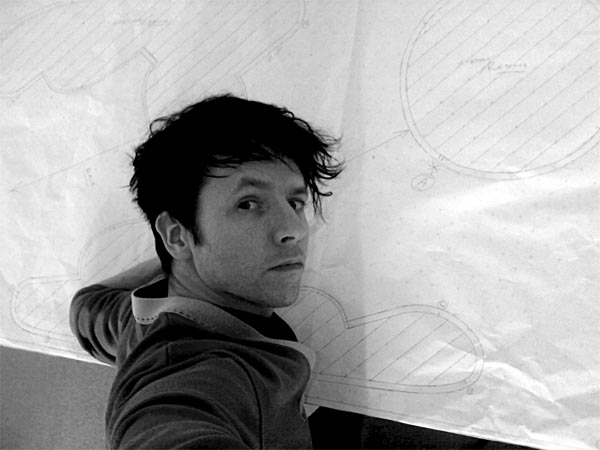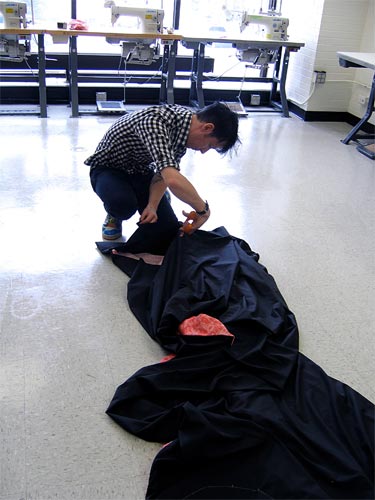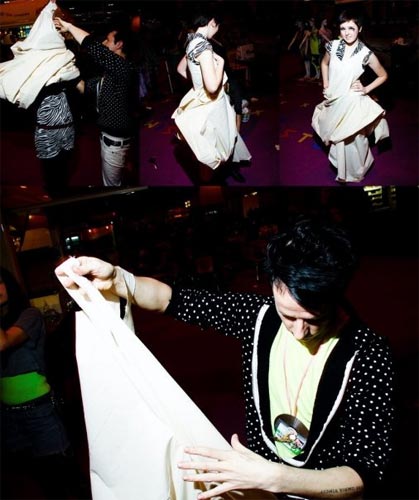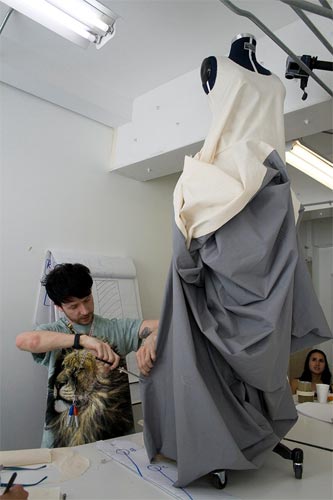Julian Roberts, successful designer and popular mentor for the BBC Blast Your Label fashion project for aspiring fashion professionals, has taken time out from his schedule to give us an insight into the the ups and downs of working in the world of designers, divas and deadlines.
Did you always know you wanted to get into the fashion industry?
I jumped into fashion at the age of 16. It was a bit of a shock to my family because they thought I was going to be a computer programmer! I was always intrigued by music and faction styling, like mods, two tone ska, punks, early new romantics, casuals and ravers. This sort of style-fanaticism made me view fashion as being a very powerful thing.
Did you have any setbacks?
Endless! You have to persist continuously, changing and adapting as you go. Fashion is hugely competitive in all areas, so you have to take the rough with the smooth and work very hard to be successful. It is important to define your own view of success. Its love not just money. Fame & fortune are fickle. Designers come and go: fashion is always on the move, so you have to ride these waves very cleverly if you want to sustain a long career in fashion.
What was your first big break?
I suppose my first important break came at college when I had a collection shown in Liberty’s shop windows in London, and then went to work with Jasper Conran for a couple of years. That was a learning curve.
What is next for you?
Although I have had lots of shows, I’ve not made my life easy by chop-changing label names, showing then not showing, pushing my work into education rather than boutiques, and being experimental or accidental. But I wouldn’t change a single thing about the journey. I had to do it this way to maintain my own enjoyment in the work I do. I want to continue teaching my cutting & making techniques abroad and in the UK, and take on a bigger challenge working with fashion education in the UK.
We are at a big turning point right now: the decade is changing, a new time begins. This is always the most exciting moment to be in fashion, watching and waiting, marking time before you make a move.
What do you enjoy most about designing?
To me designing, making and marketing are all the same thing. I enjoy the huge diversity of it. Whether I am working alone on a project in the early hours, or nomadically living out of suitcases eating airplane food teaching abroad, or working with a team of assistants towards a show… It’s all exciting, there’s so much to think about, every day is different.
What one piece of advice would you give a wannabe designer?
Work really hard! Don’t be frightened to leap in or get your hands dirty. Be kind and caring to those you work for, or who work for you. Don’t lose track of who you are, what your strengths are, and those who really connect with your work, not just like it because it’s cool. When you leave school or college and go it alone, the hardest thing of all is being accountable. Without a timetable and someone to tell you what to do it can be hard to self-motivate and get things done on time. You have to either be disciplined or otherwise you need to get someone in your life to manage you, mentor you or pressurize you. It’s always easier working for
others; working for yourself is a different matter!
Can you tell me more about the films you’ve made?
I have made films since a student. To start with I made films about my own
clothes to promote them, and then I got into music video. I shot and edited lots of experimental fashion/music/art films for various bands and musicians, as well as a series for SuperSuper Magazine. Whenever I give garment cutting master classes I always talk against a projected video backdrop of shows and videos I have edited. It takes the emphasis off me and bombards the senses. I guess I started making videos in the first place because I was never great at talking. I was quite shy, so video told the story for me and had a louder
voice.
What do you think is the toughest job to do within fashion?
I think every job in fashion is hard, whether you work in PR or garment manufacture, are a stylist or an accountant. Being the head of any major fashion organization, whether in design, media, buying or education is an exciting and fraught place to be. The assistants are the people I most admire: the people who feed the chiefs the inspiration and facts they most need in order to stay sharp and ahead of the game. The ones who work far more for love than money. The toughest jobs are probably the ones where you work like a soldier ant to support the most delicate and inflated egos, whilst living on the breadline.
Where do you think is the best source of inspiration?
Abroad and away from home. Travelling somewhere new or outside familiarity
always throws up surprises. I also find libraries and interesting people inspiring.
The internet is useful for random new stuff, but it’s endless and distracting, so real life experience and meeting new people is always a breath of fresh air.
What differences have you found towards fashion between the UK and US?
To my surprise I have found the US and Mexico to be far more energetic and excited about new approaches to making and designing. Perhaps in the UK there is a bigger turnover of ideas. Creative voices are not heard or listened to above the white noise of everyone shouting at once ‘look at me!’
But in America and Mexico it seems that there is a real appreciation for thoughtful ideas which others can share, emulate and participate in. It seems less pretentious and insecure. People really want to widen their minds and learn new skills, not just be famous.
Do you have an ultimate favourite designer? Why?
Comme des Garcons: nobody has pushed garment construction as creatively as they have. They have shown real tenacity.
Where does your inspiration come from?
Everywhere. But particularly personal experience and experimentation. You cannot be too scared to make mistakes: Perhaps what goes wrong will turn right. I love music, TV, film, internet, graphics, photography, art and people. I’m a sponge I absorb it all. What you do with all this stuff is what is important: it has to go somewhere. You have to filter it into something which makes sense of the here and now. That’s what fashion is.
Do you enjoy working with the students on Your Label: how does it compare with
mentoring in the US?
The Your Label crew are great fun to be around, even when they’re occasionally heading for an iceberg! Their experience is real, they’re grappling with new skills, and it’s good to stand back and let them learn from their own mistakes sometimes. That way they find new solutions around problems. With BBC Blast’s Your Label project we have filmed the students making a collection together and planning a real show, whilst in America I mentor students and teachers through creative garment construction skills, without all the cameras. I have had to remind the students here to keep their focus on the collection, and to try to forget about all the cameras, and for the camera crews to sometimes back off and keep some distance.
It’s a great thing to be part of because the ups & downs are all an education. I’ve also enjoyed working with Olaf [BBC’s fashion consultant] who really Mr. Motivator is holding the entire project together. He has a great rapport with the team.
Would you do anything differently in your career? Why?
I would probably have left college earlier to work in industry or tried to sell some things whilst still at college. Trading is an invaluable experience. All fashion education ought to lead towards it more directly. The fashion university experience favours press over buyer: I would like to have been taught to be more creative with what little money I had.
Do you feel any pressure to be a good mentor?
I worry about everything I say in front of others because I grew up being quite shy and introverted. I always think hard about the advice I give and the words I choose. I like to listen hard and encourage students to learn and experiment rather than punish them for messing up or not working hard enough. I’m not very good at being the ‘bad cop’ or forcing people who don’t have a real interest to work harder. You have to have some fire to succeed, there are far too many aspiring designers already drifting around out there.
Do you have any secrets learned from previous fashion shows? What are your experiences of fashion week: what are the things/people you’ll never forget?
Fashion shows are usually insane! Everyone loses their head a little and gets over-exited back stage. There are so many people running around asking you questions: Dressers, make-up artists, models, hair dressers, show producers, PR’s, film crews etc.. It’s actually quite comical to be in the centre of the storm.
My advice is to be very well organized before you arrive, and to not get stressed when clothes don’t fit, zips break, shoes go missing, models don’t turn up, assistants steal things, the paparazzi find their way around security, or somebody throws a major strop and starts shouting under pressure: That’s the fun of a fashion show! Be ready to ad lib. Just don’t start the show too late … It’s better to get the show on the road! It’ll all be over in a flash…
Are you looking forward to the final show for 1.WO/MAN ¬ what are your
predictions/hopes?
I’m really looking forward to it! I’m not sure if I’ll be back or front stage watching, but it will be great to see everyone complete the journey and have their hard work applauded… It will be a well deserved goal reached.I predict … real human tears!
Come back next week for full coverage of the Your Label team’s very first catwalk show at London Fashion Week on September 21.








